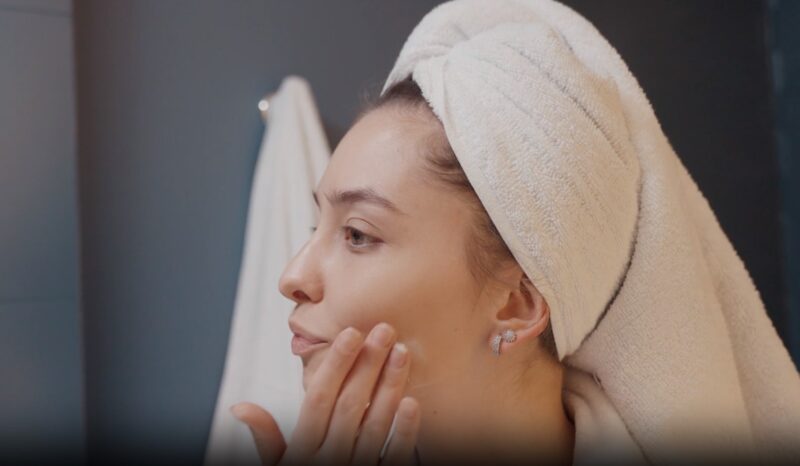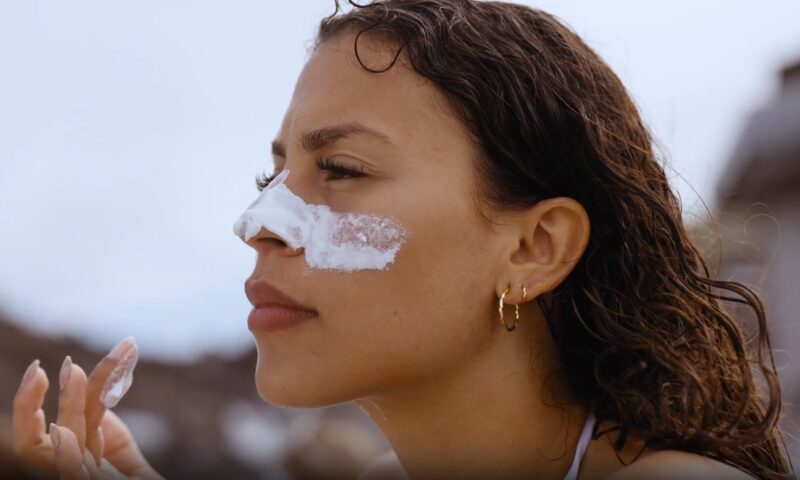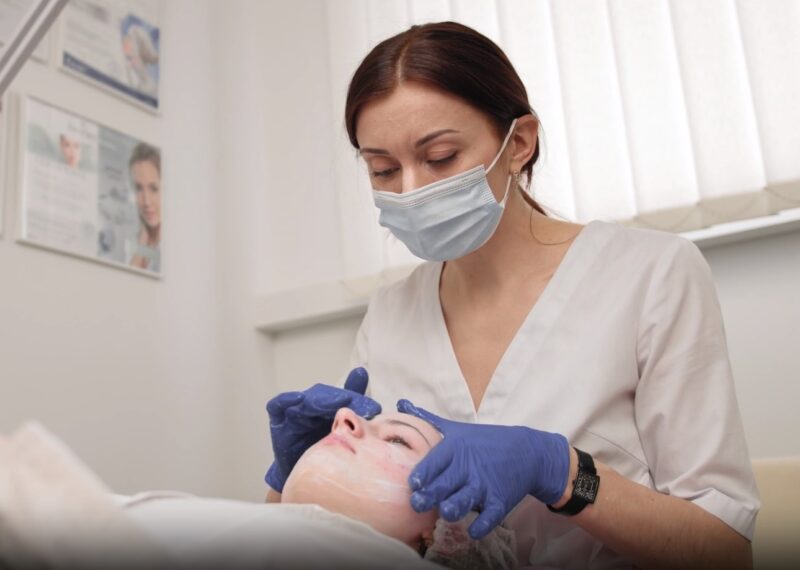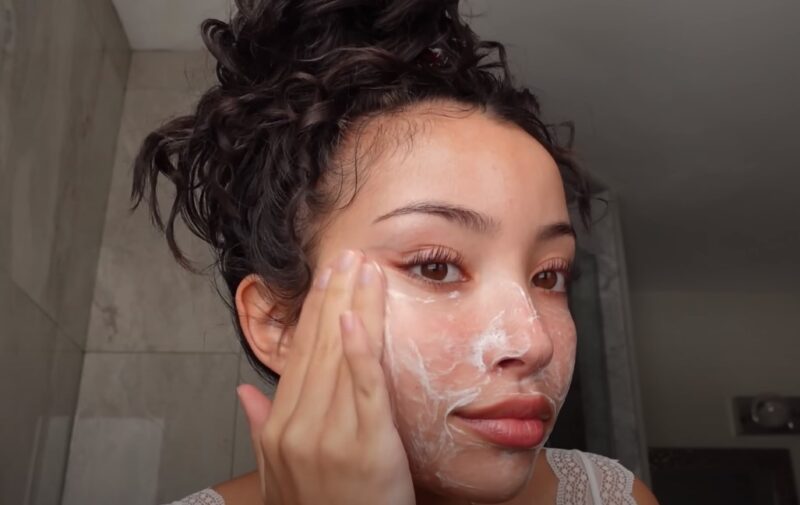Dealing with dry skin is challenging enough, but when you add pimples into the mix, it can feel like you’re battling on two fronts. It’s a common misconception that pimples are only a problem for those with oily skin.
However, those of us with dry skin know all too well that pimples don’t discriminate. Managing this dual dilemma of dryness and breakouts can be frustrating, especially when most acne advice seems tailored for oily or combination skin types.
In this comprehensive guide, we’ll explore the unique challenges of handling dry skin pimples.
What to Do?
Gentle Cleansing

The first step in combating this problem is gentle cleansing. Using mild, non-foaming cleansers is crucial as they effectively remove impurities and excess dirt without stripping the skin of its natural oils, which are vital for maintaining its health.
Hot water can be detrimental as it exacerbates dryness, leading to further irritation and potential pimple formation. Therefore, it’s recommended to use lukewarm water for cleansing.
Additionally, cleansing should be done twice daily – in the morning and at night – to ensure the skin remains clean and free from the day’s pollutants and makeup.
Hydration and Moisturization

After cleansing, immediate hydration and moisturization are key. Hydrating serums containing ingredients like hyaluronic acid are excellent for attracting and retaining moisture in the skin. These serums work by drawing moisture from the environment and from deeper layers to the surface, providing hydration to dry areas.
Following up with a moisturizer is essential; it acts as a sealant, locking in the moisture provided by the serum. When selecting moisturizers, look for products enriched with ceramides and essential fatty acids.
These ingredients are crucial in reinforcing the skin’s natural barrier, protecting against environmental irritants, and maintaining hydration.
Exfoliation
Exfoliation plays a pivotal role in managing dry skin pimples. Regular, gentle exfoliation helps in the removal of dead cells that can clog pores, a common cause of pimples. For dry skin, chemical exfoliants like lactic acid are preferable over physical scrubs.
Lactic acid gently exfoliates the skin without causing the abrasion and irritation often associated with physical scrubs. However, it’s important to limit exfoliation to once or twice a week, as over-exfoliation can strip the skin of its natural oils and exacerbate dryness and sensitivity.
Lifestyle Adjustments

- Diet and Hydration: Diet and hydration play a significant role in skin health. Consuming a well-balanced diet rich in omega-3 fatty acids, antioxidants, and vitamins can have a profound impact. Omega-3 fatty acids, found in fish, nuts, and seeds, help regulate oil production and improve hydration, reducing the likelihood of pimple formation. Antioxidants and vitamins, abundant in fruits and vegetables, combat free radicals and support skin health. Equally important is maintaining adequate hydration; drinking sufficient water throughout the day is essential for overall health and helps keep the skin hydrated and plump.
- Stress Management: Stress is a known exacerbating factor for various problems, including dry skin pimples. High-stress levels can trigger hormonal imbalances that increase oil production, leading to pimples. Managing stress through relaxation practices like yoga and meditation can have a positive impact on skin health. Additionally, ensuring adequate sleep is vital, as sleep deprivation can worsen stress and, consequently, skin health.
- Avoiding Skin Irritants: Finally, minimizing the use of products containing harsh chemicals, fragrances, and alcohol is important in the management of these pimples. These substances can irritate and dry out the skin, leading to increased sensitivity and pimple formation. Opting for hypoallergenic and non-comedogenic skincare products can significantly reduce the risk of irritation. These products are specifically formulated to be gentle on the skin and to not clog pores, making them ideal for those with dry, pimple-prone skin.
Tips for Preventing Dry Skin Pimples
1. Consistency Is Key!
Establishing and maintaining a consistent skincare routine is crucial for managing dry, acne-prone skin. This routine should be simple yet effective, including fundamental steps like cleansing, moisturizing, and applying sunscreen.
Consistency not only helps to maintain the health of the skin barrier but also ensures that the skin is regularly cleared of impurities that could lead to pimples. It’s important to perform these steps daily, both in the morning and at night, to achieve optimal results.
2. Choose Products Wisely
Selecting the right skincare products is vital for preventing pimples. Products should be specifically formulated for dry, acne-prone skin. It’s essential to avoid ingredients that are known to clog pores (comedogenic) or excessively dry out the skin, such as certain alcohol or heavy oils.
Instead, opt for non-comedogenic and hydrating ingredients that nourish the skin without causing breakouts. Reading labels and understanding product formulations can greatly assist in making the best choices for you.
3. Sun Protection

Protecting the skin from the sun is a crucial step in any routine, especially for those with dry, acne-prone skin. Ultraviolet (UV) rays can exacerbate both acne and the dryness of the skin. Daily application of a broad-spectrum sunscreen with an SPF of at least 30 can prevent these adverse effects.
Sunscreens not only protect against UV damage but also prevent post-acne marks from becoming darker and more noticeable.
4. Know Your Ingredients.
It’s important to familiarize yourself with skincare ingredients that are beneficial for pimples. Hydrating ingredients like hyaluronic acid, niacinamide, and glycerin are excellent for providing and retaining moisture in the skin.
For mild acne, ingredients like salicylic acid can be helpful, but they should be used judiciously to avoid over-drying the skin.
5. Avoid Irritants.
Avoiding skin irritants is crucial in preventing dry skin pimples. Ingredients like sodium lauryl sulfate, denatured alcohol, and synthetic fragrances can irritate and dry out the skin, leading to increased sensitivity and potentially exacerbating acne.
It’s important to read product labels and avoid these irritants, especially if your skin is sensitive.
6. Patch Testing
Before incorporating any new product into your skincare routine, it’s essential to perform a patch test. This involves applying a small amount of the product to a discreet area of skin, typically on the inner arm or behind the ear, to check for any adverse reactions like redness, itching, or worsening of pimples.
Professional Treatments

Consulting with a dermatologist can provide valuable insights and personalized advice for managing this problem. Dermatologists can assess your skin type and condition, offering recommendations tailored to your specific needs.
They may also prescribe treatments such as topical retinoids or antibiotics, which can be more effective for persistent or severe pimples. Professional treatments, such as hydrating facials or light therapy, can also be beneficial.
These treatments are often more intensive than at-home care and can provide targeted solutions to specific concerns. They can also offer immediate relief and visible improvements in skin texture and hydration.
Medication
In some cases, particularly for severe or persistent acne, a dermatologist might recommend oral medications. These could include hormonal treatments or isotretinoin, which can be effective even for those with dry skin.
However, these medications often require careful monitoring and should be considered after a thorough discussion with a healthcare professional.
DIY Treatments
- Natural Masks: Homemade masks using natural ingredients like honey, oatmeal, or aloe vera can provide soothing and hydrating benefits to dry skin while addressing pimples. These ingredients are gentle and can help reduce inflammation and redness associated with acne.
- Oil Treatments: Some natural oils, like diluted tea tree oil, offer antibacterial benefits, which can be helpful in treating pimples. However, it’s important to be cautious as some oils can be comedogenic (pore-clogging). Always use oils in moderation and choose those known for their non-comedogenic properties.
- Steam Therapy: Gentle steam can help open pores and hydrate the skin, making it beneficial for dry skin. It can also aid in the removal of impurities and improve blood circulation. However, excessive steaming should be avoided as it can lead to further dryness and irritation.
The Role of Diet and Supplements

Diet plays a crucial role in skin health. Incorporating foods high in vitamins A, C, E, and zinc can benefit the skin by enhancing its natural barrier and reducing inflammation. Reducing the intake of processed and sugary foods can also help minimize pimples, as these foods can trigger inflammation and exacerbate acne.
Supplements like omega-3 fatty acids, zinc, and vitamin E can support skin health. Omega-3s, in particular, have anti-inflammatory properties, which can be beneficial for acne-prone skin.
Before starting any supplement regimen, it’s advisable to consult with a healthcare provider to ensure they are appropriate for your individual health needs.
Hydration
Maintaining internal hydration is as crucial as external hydration for healthy skin. Adequate water intake helps in maintaining skin hydration and elasticity, reducing the likelihood of pimples.
Stress Reduction

Reducing stress can positively impact skin health. Engaging in activities like yoga, meditation, or regular exercise can help manage stress levels. Stress can trigger hormonal changes that exacerbate acne, so managing stress is an important aspect of acne prevention.
Sleep
Quality sleep is essential for skin repair and overall health. During sleep, the body repairs and regenerates cells, which is crucial for maintaining healthy skin. Lack of sleep can lead to increased stress and hormonal imbalances, which can exacerbate acne.
Aim for 7-9 hours of uninterrupted sleep each night to support skin health and overall well-being.
FAQs
Can makeup worsen dry skin pimples, and if so, how can I prevent this?
Yes, certain types of makeup can worsen this condition. To prevent this, use non-comedogenic and hypoallergenic makeup products that are less likely to clog pores or irritate the skin.
Also, ensure that you thoroughly remove makeup at the end of the day with a gentle cleanser and avoid heavy, oil-based foundations and concealers. Opting for mineral-based makeup products can also be beneficial.
Are there any specific vitamins or minerals that I should include in my diet to help with dry skin pimples?
Yes, certain vitamins and minerals can be particularly beneficial. Vitamin A helps regulate skin cell turnover, Vitamin D can boost the skin’s immune system, and Zinc has anti-inflammatory properties that can reduce acne severity.
Including foods rich in these nutrients, like leafy greens, nuts, seeds, and lean meats, can be helpful.
Is it safe to use spot treatments on dry skin with pimples, and what kind should I use?
Yes, it’s safe to use spot treatments but choose them carefully. For dry skin with pimples, look for spot treatments containing ingredients like benzoyl peroxide (in lower concentrations), sulfur, or salicylic acid.
However, it’s important to apply these treatments only on the pimples to avoid further drying out the surrounding skin.
How can I differentiate between pimples due to dry skin and those caused by other skin conditions like eczema or psoriasis?
Pimples due to dry skin are usually small, red, and may have a whitehead, whereas skin conditions like eczema or psoriasis often cause patches of red, flaky, and sometimes itchy skin. If you notice a persistent rash or irritation that doesn’t respond to typical acne treatments, it’s best to consult a dermatologist for an accurate diagnosis.
Can changing my pillowcase frequently help with dry skin pimples, and if so, how often should I change it?
Yes, changing your pillowcase frequently can help. Pillowcases can accumulate oils, dead skin cells, and bacteria, which can aggravate pimples. For individuals with acne-prone skin, it’s advisable to change the pillowcase at least once a week or consider using hypoallergenic pillowcases.
Are there any specific environmental factors that can worsen dry skin pimples, and how can I protect my skin?
Environmental factors like extreme temperatures, low humidity, and pollution can exacerbate dry skin pimples. To protect your skin, use a humidifier in dry environments, apply a protective moisturizer, and use gentle, hydrating products.
Additionally, protect your skin from harsh winds and sun exposure by wearing appropriate clothing and using sunscreen.
Final Words
In conclusion, managing dry skin pimples requires a combination of targeted skincare, lifestyle adjustments, and sometimes professional intervention.
By understanding the unique needs of dry, acne-prone skin and making informed choices about skincare and lifestyle, one can effectively reduce and prevent pimples while maintaining healthy, hydrated skin.

